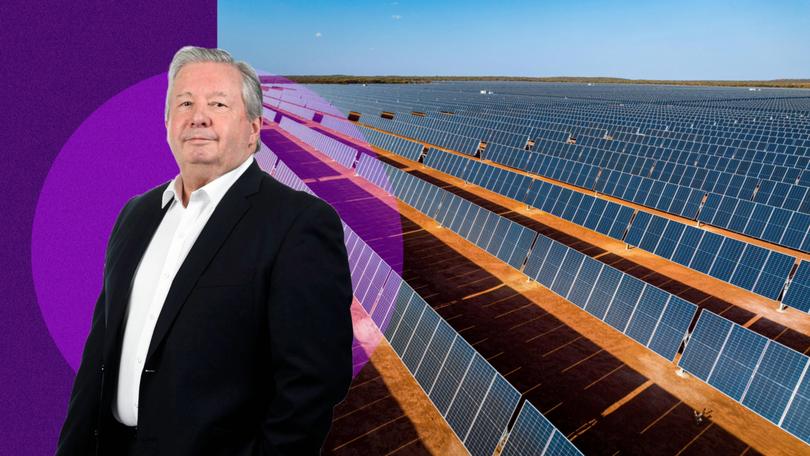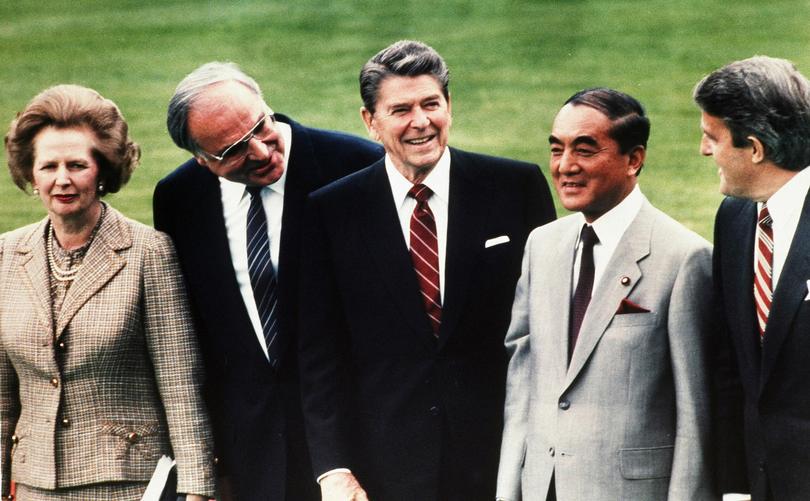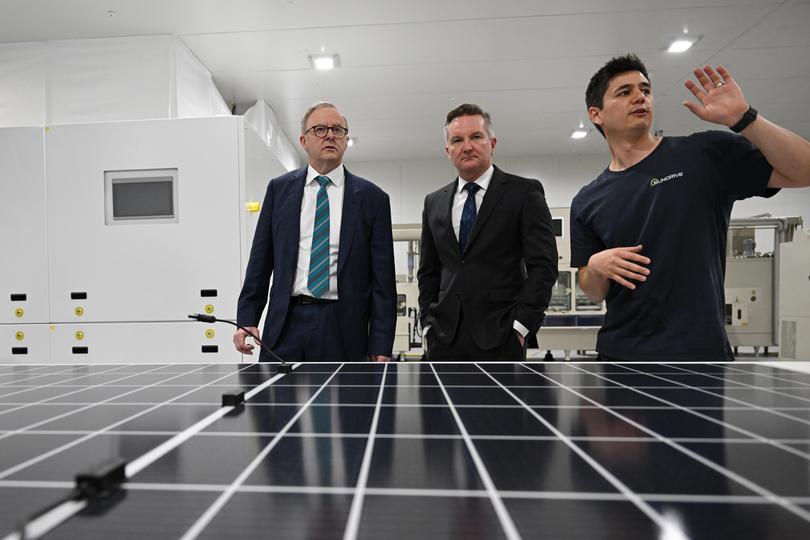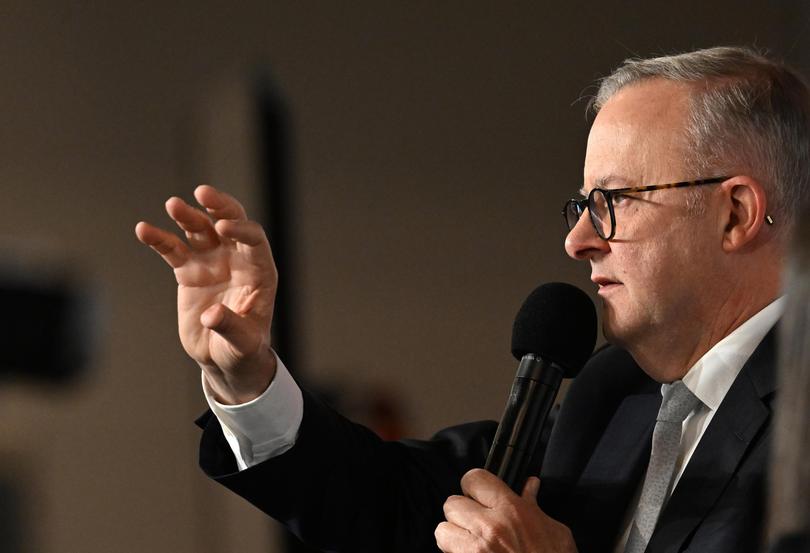PAUL MURRAY: Is $1 billion really going to give the Chinese a run for their money producing solar panels?
PAUL MURRAY: The Prime Minister’s solar panels handout is like Ronald Reagan’s famous line about how ‘the problem with socialism is that you eventually run out of other people’s money’.

It was Ronald Reagan who said that the nine most terrifying words in the English language were: “I’m from the government, and I’m here to help.”
That was back in 1986 when the American president and his friend, UK prime minister Margaret Thatcher, were the standard-bearers for free market economics, also known as neoliberalism by its critics, based around smaller and less interventionist governments.
Unfortunately, Kevin the Pretender mangled Reagan’s clever line in 2007 when trying to convince Labor’s national conference he was a good choice as a leader to take the party into government.
Sign up to The Nightly's newsletters.
Get the first look at the digital newspaper, curated daily stories and breaking headlines delivered to your inbox.
By continuing you agree to our Terms and Privacy Policy.“My name is Kevin, I’m from Queensland and I’m here to help,” Rudd said.
Three years later, Labor’s national caucus worked out that he wasn’t helping and sacked Kevin Rudd as Prime Minister.
And then three years after that they sacked his successor and reinstated the Pretender — with his mate Anthony Albanese as deputy — provoking the Australian people three months later to dump him again. For not helping.
But that’s another story. Partly.

Reagan’s words are often quoted by people advocating for less government intervention, but, strangely enough, the truth was a little different.
He had been that morning to the Illinois State Fair, a bit like our royal show, and had a message for America’s farmers who were struggling, despite a booming economy with the lowest inflation in 20 years.
“Our ultimate goal, of course, is economic independence for agriculture, and through steps like the tax reform bill, we seek to return farming to real farmers,” Reagan said after uttering the famous line. “But until we make that transition, the Government must act compassionately and responsibly.
“In order to see farmers through these tough times, our administration has committed record amounts of assistance, spending more in this year alone than any previous administration spent during its entire tenure. No area of the budget, including defence, has grown as fast as our support for agriculture.”
So the old stager was portraying a blatant election bribe as a reluctant diversion from economic policy.
As with most quotations, context is critical. Consider Reagan’s line about “transition” and its relevance to our circumstances with energy generation.
This brings us to the attack on free market economics now in vogue in Labor Australia.
Last month, Prime Minister Albanese splashed $1 billion of your money on a startup business no one has ever heard of which is supposedly going to give the Chinese a run for their money producing solar panels.
And since then, emboldened, he has doubled down, pledging that the upcoming Budget will contain what amounts to a revolution in direct government support for the renewable energy transition.
When you peel back the rhetoric from Albanese and Treasurer Jim Chalmers, what appears to be policy is little more than a thought bubble.
First up, Labor has no electoral mandate for what Albanese is now describing. It goes way beyond anything canvassed before the last election.
Secondly, the Budget is not the right place to develop new economic policy. The government should debate the rights and wrongs of what it is intending to implement before committing revenues to any policy — which is what the Budget does.

In this case, the proposed spending is massive, potentially building structural costs into the economy for generations to come.
This is reckless ideological adventurism. And here’s the proof.
On the day that Albanese and two of his ministers made their infamous twin flights to the site of the old Liddell power station in the Hunter Valley to announce his $1 billion solar panels handout, he was asked a very pertinent question by a journalist which was, sadly, widely unreported.
Journalist: “Will Australia make solar cheaper than the ones made in China? And if not, how can you be sure that Australians will buy them?”
Albanese: “These are the most efficient solar panels in the world. These are good products. They will last for longer, they will be commercially available, and we are very confident that Australians will have Australian panels on their roofs.
“This technology that’s been developed is the best in the world. We’ve missed out in the past, and that’s a tragedy. When we think about Australia, we should be so proud that of so many — everything from the black box to Wi-Fi to solar panels — we have been innovative.
“From time to time we’ve been effective at value-adding, but too many times we’ve just let those opportunities go past.
“When you have the best product, most efficient in the world, for something that will grow in demand, then we are very, very confident — as well as using the procurement policies of the government, using the power of government purchasing as well, and we have a made in Australia policy as well in our national Government — that you can use government to, if you like, provide the comfort of that base going forward and then go out, not just to Australia, but I see opportunities from this Sunshot program to export to the world as well — of the range of products that we have, and energy that we can produce here in Australia, as well.”

Wow. The power of government purchasing? Exports to the world?
Unfortunately, there was more: “As with new technology, one of the things that is happening and why I’m confident about the broader issue of a future made in Australia — without getting too philosophical about it — with new technology and advanced manufacturing techniques, the proportion of labour in the costs of production has been reducing over a long period of time.
“So, in the 1970s and 1980s, when we saw Australian manufacturing depart Australia, it was about labour costs. Because transport is a higher proportion of the costs of production, particularly for domestic use, and labour costs are far less, then the competitive nature changes between Australia (and) developing countries.”
Does any of that bluster inspire confidence? Where’s the evidence? It’s all wishin’ and hopin’. And blah-blah-blah.
The reality is that these solar panels are not in production. How they eventually rate in terms of efficiency and cost against their competitors is untested.
No one is saying at what price they will eventually be sold, but anyone who has ever bought a domestic PV system knows it is a ruthlessly competitive market and that is the key determinant.
After the $1 billion handout to kickstart the venture, Albanese says the government will buy these panels — even if no one else does, and presumably regardless of cost.
It’s as easy as offering a visa to a brave Frenchman with no transparent process. Check the ego.
And there are two subsidies. The $1 billion up-front cost is known, but the other “buy-it-and-they-will-come” is open-ended.
As many people complain, if renewables were as cheap as Albanese claims, why are there still endless subsidies?
Albanese is fabricating an argument that Australia’s previously prohibitive labour costs are now a lower percentage of goods manufactured here. Prove it.
He posits this while pushing up wages — already high when compared internationally — and when COVID-boosted transport costs to overseas markets and our rocketing domestic energy costs remain punitive.
This solar panels fiasco is just a tiny taste of what Albanese has planned.
His mate Kevin Rudd’s botched delivery of the Home Insulation Program and Building the Education Revolution scheme — colloquially known as the pink batts and school halls scandals — will pale by comparison.
Albanese ended his 550-word non-answer to that solar panels question by blaming the coalition for abandoning manufacturing: “They told the car industry to leave. That had consequences for Australian jobs in Australia’s economy.”
Cold shower. During the long demise of our home-grown automobile industry, we got a good idea from many government inquiries of the real cost of subsidising work which had become internationally uncompetitive. A massive drag on the economy.
Essentially, the Australian car industry died because consumers wanted cheaper cars and the government of the day wasn’t prepared to continue subsidising them. Nor should it.
When the taxpayer cash pipeline was turned off, the carmakers walked away.
Will the renewables projects Albanese picks as winners be subsidised forever? Because if they aren’t, the same result will likely eventuate.
It is the responsibility of any government wanting to take the nation in a new direction to educate the public about its plans and then seek some form of mandate.
What Albanese is proposing — and what his chameleon Treasurer may or may not be appeasing — is a radical departure from economic policies that even his most recent Labor predecessors followed.
And light years away from the successful Hawke-Keating era.
As Ronnie Reagan’s partner in economic crime said in another famous quote: “The problem with socialism is that you eventually run out of other people’s money.”
And the further problem is it often takes quite a while for that to happen – and even longer to recover.
Venezuela, we see you.
